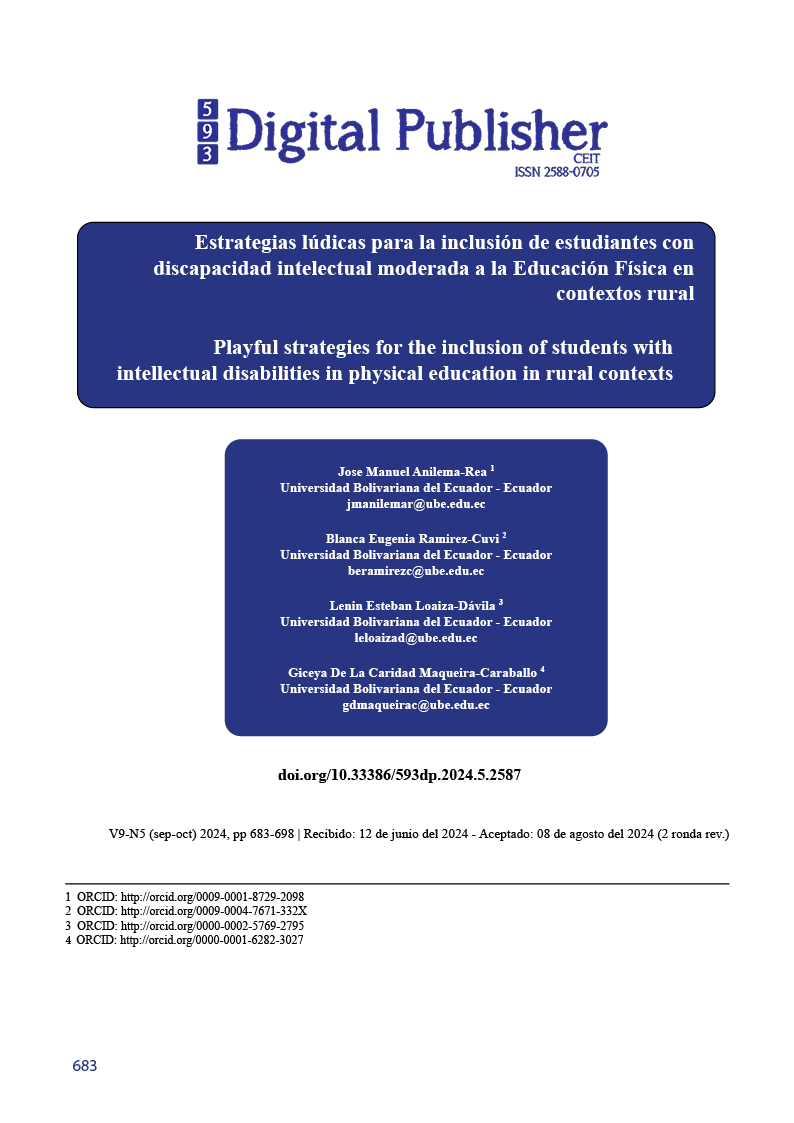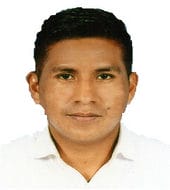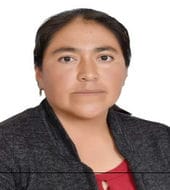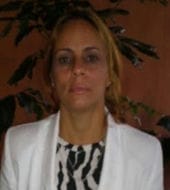Playful strategies for the inclusion of students with intellectual disabilities in physical education in rural contexts
Main Article Content
Abstract
The main objective of this study was to design a series of play strategies adapted for the inclusion of students with intellectual disabilities (ID) in Physical Education classes in rural environments. The sample studied consisted of 6 students belonging to the Sublevel of General Basic Secondary Education, including a student diagnosed with moderate ID, grade 3, aged 12 years old. A mixed research approach was applied, of pre-experimental design type, by explanatory-applicative scope, field and longitudinal cut in the qualitative line and a focus group design in the qualitative line of the study. The technique applied to obtain data in the initial and final diagnostic stage in the quantitative line was observation and as an instrument an observation form to determine the level of inclusion in the Physical Education class, as well as a focus group for the development of the qualitative line. The proposal “Playful strategies for the inclusion of students with ID in Physical Education in rural contexts” was designed and focused on the implementation of adapted and accessible activities for all students, with special attention to those with ID with a duration of 5 weeks and 10 sessions of 55 minutes each. The quantitative and qualitative results together underlined the success of the intervention in significantly improving inclusion in the Physical Education class in a rural context.
Downloads
Article Details

This work is licensed under a Creative Commons Attribution-NonCommercial-ShareAlike 4.0 International License.
1. Derechos de autor
Las obras que se publican en 593 Digital Publisher CEIT están sujetas a los siguientes términos:
1.1. 593 Digital Publisher CEIT, conserva los derechos patrimoniales (copyright) de las obras publicadas, favorece y permite la reutilización de las mismas bajo la licencia Licencia Creative Commons 4.0 de Reconocimiento-NoComercial-CompartirIgual 4.0, por lo cual se pueden copiar, usar, difundir, transmitir y exponer públicamente, siempre que:
1.1.a. Se cite la autoría y fuente original de su publicación (revista, editorial, URL).
1.1.b. No se usen para fines comerciales u onerosos.
1.1.c. Se mencione la existencia y especificaciones de esta licencia de uso.
References
Apoki, U., Hussein, A., Al-Chalabi, H., Bǎdicǎ, C., & Mocanu, M. (2022). The Role of Pedagogical Agents in Personalised Adaptive Learning: A Review. Sustainability. 14(11):6442. https://doi.org/10.3390/su14116442
Barney, D., Pleban, F. y Lewis, T. (2019). Relación entre actividad física y estrés en estudiantes de secundaria en el ámbito de educación física. El Educador Físico. https://doi.org/10.18666/TPE-2019-V76-I3-8966
Benítez, P., Kirchner, L., Ribeiro, G., & Tatmatsu, D. (2020). Educational Social Skills of parents of children with and without Intellectual Disability, 25, 415-424. https://doi.org/10.1590/1413-82712020250302
Bennasar-García, M. I., Duque Fernández, L. M., & Martínez Nadal, H. A. (2023). The educational practices of physical educators for students with special educational needs during the pandemic. MHSalud: Revista En Ciencias del movimiento humano y salud, 20(1), 1-18. https://doi.org/10.15359/mhs.20-1.13
Boer, H., Donker, A., Kostons, D., & Werf, G. (2018). Long-term effects of metacognitive strategy instruction on student academic performance: A meta-analysis. Educational Research Review. https://doi.org/10.1016/J.EDUREV.2018.03.002
Bondár, R., Fronso, S., Bortoli, L., Robazza, C., Metsios, G. y Bertollo, M. (2019). Los efectos de la actividad física o las intervenciones deportivas sobre los factores psicológicos en adultos con discapacidad intelectual: una revisión sistemática. Revista de investigación sobre discapacidad intelectual: JIDR. https://doi.org/10.1111/jir.12699
Castella, J. (2009). Assessing the role of learning devices and geovisualisation tools for collective action in natural resource management: Experiences from Vietnam. Journal of environmental management, 90 2, 1313-9 . https://doi.org/10.1016/j.jenvman.2008.07.010.
Chalmers, L., & Faliede, T. (1996). Successful Inclusion of Students with Mild/Moderate Disabilities in Rural School Settings. TEACHING Exceptional Children, 29, 22 - 25. https://doi.org/10.1177/004005999602900106
Finkelstein, S., Sharma, U., & Furlonger, B. (2019). The inclusive practices of classroom teachers: a scoping review and thematic analysis. International Journal of Inclusive Education, 25, 735 - 762. https://doi.org/10.1080/13603116.2019.1572232
Frania, M., & Correia, F. (2022). Interpersonal Competences and Attitude to Online Collaborative Learning (OCL) among Future Pedagogues and Educators—A Polish and Portuguese Perspective. Education Sciences. 12(1):23. https://doi.org/10.3390/educsci12010023
González-Lomelí, D., Maytorena-Noriega, M., González-Franco, V., López-Sauceda, M., & Fuentes-Vega, M. (2021). Zona de Desarrollo Próximo y Desempeño de Universitarios en una Prueba de Ejecución., 58, 93-103. https://doi.org/10.21865/RIDEP58.1.08
Hayes, A., & Bulat, J. (2017). Disabilities Inclusive Education Systems and Policies Guide for Low- and Middle-Income Countries. Occasional Paper. RTI Press Publication OP-0043-1707. . https://doi.org/10.3768/RTIPRESS.2017.OP.0043.1707
Hussein, A., & Al-Chalabi, H. (2020). Pedagogical Agents in an Adaptive E-learning System. SAR Journal - Science and Research. 3(1), 24-30. https://doi.org/10.18421/sar31-04
Jensen, T. (2013). Embodied emotional communication in learning activities involving children with intellectual disabilities. Journal of Interactional Research in Communication Disorders, 4(2), 185-210. https://doi.org/10.1558/jircd.v4i2.185
Jeoung, B. (2018). Motor proficiency differences among students with intellectual disabilities, autism, and developmental disability. Journal of Exercise Rehabilitation, 14, 275 - 281. https://doi.org/10.12965/jer.1836046.023
Knight, V., Huber, H., Kuntz, E., Carter, E., & Juarez, A. (2019). Instructional Practices, Priorities, and Preparedness for Educating Students With Autism and Intellectual Disability. Focus on Autism and Other Developmental Disabilities, 34, 14 - 3. https://doi.org/10.1177/1088357618755694
Kohan, S. (2023). Development of physical potential of students with disabilities through table and floor sports games. Human Health, Theory and Methodology of Physical Education and Sport, 29(1), 14-21. http://hpcas.ru/article/view/12790
Lucero, A., Mason, E. y Gaudreault, K. (2023). Exploración activa en educación física: estrategias para incluir a estudiantes marginados. Revista de Educación Física, Recreación y Danza, 94, 41 - 48. https://doi.org/10.1080/07303084.2022.2156942
McManus, J., Saucier, D. y Reid, J. (2021). Una revisión metaanalítica de intervenciones para mejorar las actitudes de los niños hacia sus compañeros con discapacidad intelectual. Psicología Educativa Contemporánea, 65, 101948. https://doi.org/10.1016/J.CEDPSYCH.2021.101948
Mero Piedra, A. L. (2020). Playful Practices With Children With Intellectual Disabilities. West East Journal of Social Sciences, 9(1), 9-22. https://doi.org/10.36739/wejss.2020.v9.i1.38
Nycyk, M. (2018). Education Support for Adults With an Intellectual Disability: A Tutor’s Reflection. Adult Learning, 29(4), 176-178. https://doi.org/10.1177/1045159518783981
Özkan, Z., & Kale, R. (2023). Investigation of the effects of physical education activities on motor skills and quality of life in children with intellectual disability. International Journal of Developmental Disabilities, 69(4), 578–592. https://doi.org/10.1080/20473869.2021.1978267
Piedra, A. (2020). Playful Practices With Children With Intellectual Disabilities. , 9, 9-22. https://doi.org/10.36739/wejss.2020.v9.i1.38.
Reeves, P., & Richards, C. (2014). Effect of a Geographic Barrier on Adaptation in the Dwarf Sunflower (Helianthus pumilus Nutt.). International Journal of Plant Sciences, 175, 688 - 701. https://doi.org/10.1086/676305
Rodríguez, C., Sanchez, F., & Armenta, A. (2010). Do Interventions at School Level Improve Educational Outcomes? Evidence from a Rural Program in Colombia. World Development, 38, 415-428. https://doi.org/10.1016/J.WORLDDEV.2009.10.002
Rojo-Ramos, J., Vega-Muñoz, A., Contreras-Barraza, N., & Barrios-Fernández, S. (2022). Alumnas y alumnas de escuelas rurales muestran actitudes más positivas hacia la discapacidad durante las clases de educación física. Revista Internacional de Investigación Ambiental y Salud Pública, 19. https://doi.org/10.3390/ijerph19105881
Ross, C. (2021). Below-average intellectual and adaptive functioning. Child and Adolescent Psychiatry, 3, 17-24 https://doi.org/10.1093/med/9780197577479.003.0003
Safavi, H., & Kumari, D. (2022). Education Of Children With Intellectual And Developmental Disabilities In Rural India. Journal of Pharmaceutical Negative Results. 13(8), 4620-4624. https://doi.org/10.47750/pnr.2022.13.s08.597
Sevil-Serrano, J., Aibar, A., Abós, Á., Generelo, E., & García-González, L. (2020). Improving motivation for physical activity and physical education through a school-based intervention. The Journal of Experimental Education, 90, 383 - 403. https://doi.org/10.1080/00220973.2020.1764466
Tanure Alves, M. L., Grenier, M., Haegele, J. A., & Duarte, E. (2020). ‘I didn’t do anything, I just watched’: perspectives of Brazilian students with physical disabilities toward physical education. International Journal of Inclusive Education, 24(10), 1129–1142. https://doi.org/10.1080/13603116.2018.1511760
Thomson, A., Bridges, S., Corrins, B., Pham, J., White, C., & Buchanan, A. (2021). The impact of physical activity and sport programs on community participation for people with intellectual disability: A systematic review. Journal of Intellectual & Developmental Disability, 46(3), 261–271. https://doi.org/10.3109/13668250.2020.1717070
Tirri, K., & Laine, S. (2017). Ethical challenges in inclusive education: The case of gifted students. , 9, 239-257. https://doi.org/10.1108/S1479-363620170000009010
Thomas, B., & Rajdeep, C. (2021). Life Skill Education: Enhancing Empowerment among Rural Primary School Children in Gujarat, India . Space and Culture, India, 8(4), 22–32. https://doi.org/10.20896/saci.v8i4.898
Uleanya, C., Gamede, B., & Kutame, A. (2020). Rural and irrelevant: exploration of learning challenges among undergraduates’ rural universities. African Identities, 18, 377 - 391. https://doi.org/10.1080/14725843.2020.1767037
Valentini, M. y Morosetti, A. (2021). Movimiento, ejercicio verde y parques infantiles en edad de desarrollo, para un estilo de vida correcto. Revista de deporte y ejercicio humanos - 2021 - Conferencias de primavera de ciencias del deporte. https://doi.org/10.14198/JHSE.2021.16.PROC4.03
Vasilakopoulou, S. (2022). Strategies and conditions for the inclusions intellectually disabled people in education. Conferencii. https://doi.org/10.51586/rai2022-2-3
Yogman, M., Garner, A., Hutchinson, J., Hirsh-Pasek, K., & Golinkoff, R. (2018). The Power of Play: A Pediatric Role in Enhancing Development in Young Children. Pediatrics, 142. https://doi.org/10.1542/peds.2018-2058





